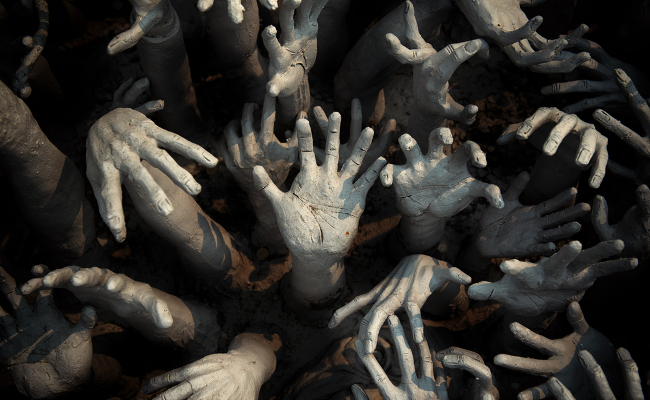
We’ve all developed a plan to escape from the zombie apocalypse, however laughable it may be. But fortunately, it’s never gotten beyond Walking Dead gags and buying Max Brooks novels (for most of us). Medieval England, on the other hand, did not screw around with a potential zombie apocalypse. We now have the first good evidence that our ancestors regularly mutilated the dead to prevent them from rising.
Archaeologists have released a fascinating multidisciplinary study that essentially boils down to a small village suddenly, and completely, believing the dead were returning to spread disease and kill. The village, Wharram Percy, an abandoned locale that has likely been a human settlement for thousands of years, has coughed up a lot of interesting data about how we lived across the centuries, and in 1963, there was a grisly find: A pile of human bones that had all the signs of being mutilated and burned. Adding to the creepiness, it appeared that these attacks had happened in a number of different incidents. But why?
After extensive historical research, there’s an even creepier answer: This is how the people of Wharram Percy dumped their “revenants.” In the Middle Ages it was widely believed that evil spirits could take over a corpse — especially if it was the corpse of somebody who’d been a terrible person in life — and use it to kill people or spread disease. This was the root of the vampire myth, among other things, but the blood-sucking and superpowers came later. In order to prevent more death and destruction, medieval villagers were supposed to burn the corpse, cut its head off, or rip off its limbs. Until now, however, we’d never found any evidence that Medieval people actually did this. (And now that we have, expect a TV show.)
That said, this isn’t incontrovertible proof that the people of Wharram Percy believed in zombies. The study’s authors point out it could also be an unknown ritual local to the area, or there could be some other reason that hasn’t been uncovered yet. And there remains the unnerving question of why we’ve found evidence of this at Wharram Percy, but have yet to discover corroborated evidence elsewhere. Expect that to be addressed in numerous cable specials over the next several years.
(Via Gizmodo)






